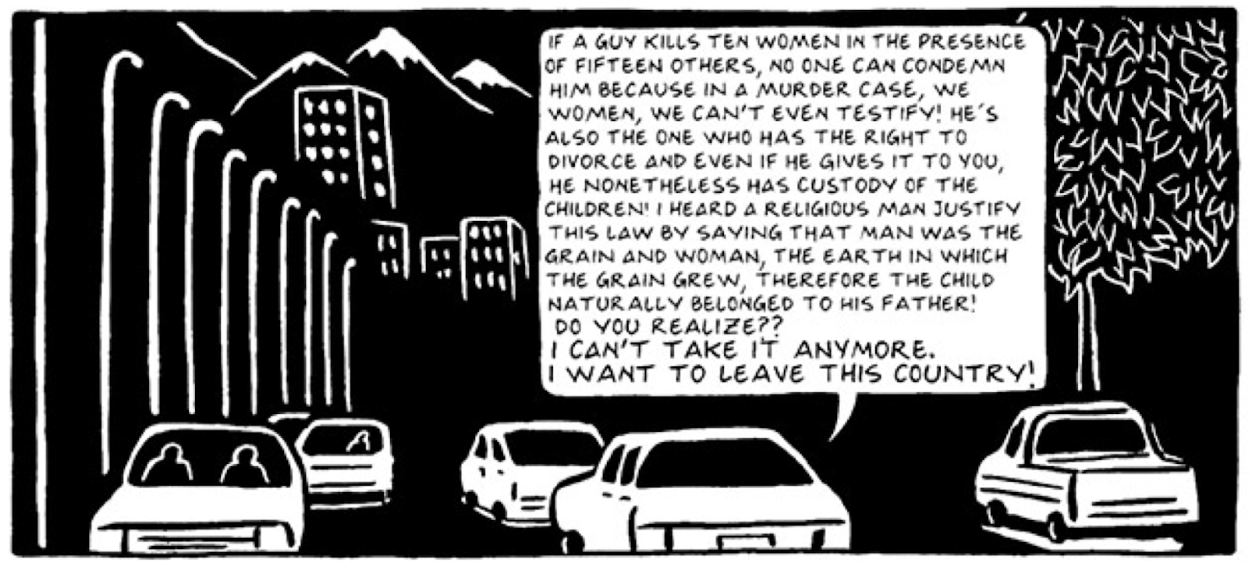
Persepolis is an autobiographical series by Marjane Satrapi, depicting her childhood and adolescence in Iran and Austria, during and after the Islamic Revolution. The following quote was uttered by Marjane before she decided to ultimately leave Iran.

“If a guy kills ten women in the presence of fifteen others,
no one can condemn him
because in a murder case,
we women, we can’t even testify!
He’s also the one who has the right to divorce
and even if he gives it to you,
he nonetheless has custody of the children!
I heard a religious man justify this law
by saying that man was the grain and woman,
the earth in which the grain grew,
therefore the child naturally belonged to his father!
Do you realize??
I can’t take it anymore,
I want to leave this country!”
(Satrapi, 2006, p. 339)
Marjane describes a system that does not value women’s rights. To this day, this system is still in place. As we saw on September 16th, Mahsa Jina Amini was brutally beaten by Tehran’s morality police for wearing her Hijab improperly, succumbing to her injuries. Over the last 57 days, Iranians have taken to the streets, fighting against the regime and for women’s rights. Across the diaspora, Iranian women have been cutting their hair and burning their hijabs out of solidarity. The protests have been met with excessive and unlawful police violence – more than 300 people have been killed in the nationwide protests.
If you want to support the people of Iran, you can sign Amnesty International’s petition calling on the UN’s Human Rights Council to take decisive action. The petition already has more than one million signatures. On top of that, you can contact your own government’s Ministry of Foreign Affairs and urge them to support the immediate holding of a special session on Iran at the Human Rights Council. Moreover, you can insist that they publicly take a stance against Iran’s regime and take decisive actions e.g, sanctions. Lastly, keep the conversation about what is happening in Iran going – talk to your family, friends, and join demonstrations if you can. Since the Iranian authorities keep cutting off the internet in an attempt to silence the protesters, our protests and discussions are necessary to keep the movement alive and get their voices heard.
People in Iran are taking to the streets, demonstrating for a system that respects equality and human rights. While we cannot stand with them in person, we can support them from abroad by making it clear to the Iranian authorities that their crimes under international law will not go unseen or unpunished.
”Women.Life.Freedom.
Jin.Jiyan.Azadi.
ژن.ژیان.ئازادی.
Persepolis is an autobiographical series by Marjane Satrapi, depicting her childhood and adolescence in Iran and Austria, during and after the Islamic Revolution. The following quote was uttered by Marjane before she decided to ultimately leave Iran.

“If a guy kills ten women in the presence of fifteen others,
no one can condemn him
because in a murder case,
we women, we can’t even testify!
He’s also the one who has the right to divorce
and even if he gives it to you,
he nonetheless has custody of the children!
I heard a religious man justify this law
by saying that man was the grain and woman,
the earth in which the grain grew,
therefore the child naturally belonged to his father!
Do you realize??
I can’t take it anymore,
I want to leave this country!”
(Satrapi, 2006, p. 339)
Marjane describes a system that does not value women’s rights. To this day, this system is still in place. As we saw on September 16th, Mahsa Jina Amini was brutally beaten by Tehran’s morality police for wearing her Hijab improperly, succumbing to her injuries. Over the last 57 days, Iranians have taken to the streets, fighting against the regime and for women’s rights. Across the diaspora, Iranian women have been cutting their hair and burning their hijabs out of solidarity. The protests have been met with excessive and unlawful police violence – more than 300 people have been killed in the nationwide protests.
If you want to support the people of Iran, you can sign Amnesty International’s petition calling on the UN’s Human Rights Council to take decisive action. The petition already has more than one million signatures. On top of that, you can contact your own government’s Ministry of Foreign Affairs and urge them to support the immediate holding of a special session on Iran at the Human Rights Council. Moreover, you can insist that they publicly take a stance against Iran’s regime and take decisive actions e.g, sanctions. Lastly, keep the conversation about what is happening in Iran going – talk to your family, friends, and join demonstrations if you can. Since the Iranian authorities keep cutting off the internet in an attempt to silence the protesters, our protests and discussions are necessary to keep the movement alive and get their voices heard.
People in Iran are taking to the streets, demonstrating for a system that respects equality and human rights. While we cannot stand with them in person, we can support them from abroad by making it clear to the Iranian authorities that their crimes under international law will not go unseen or unpunished.
”Women.Life.Freedom.
Jin.Jiyan.Azadi.
ژن.ژیان.ئازادی.



